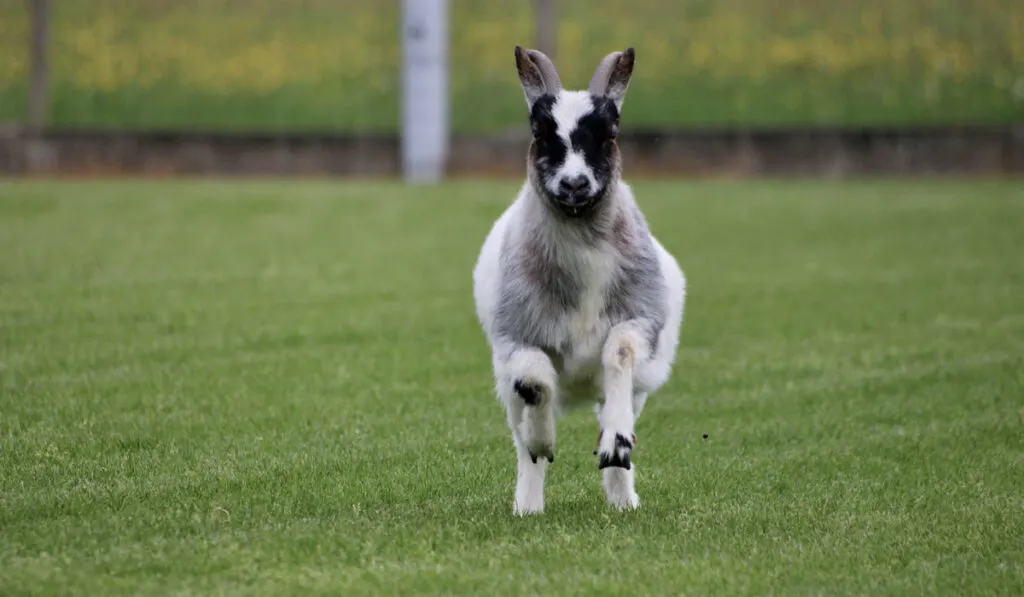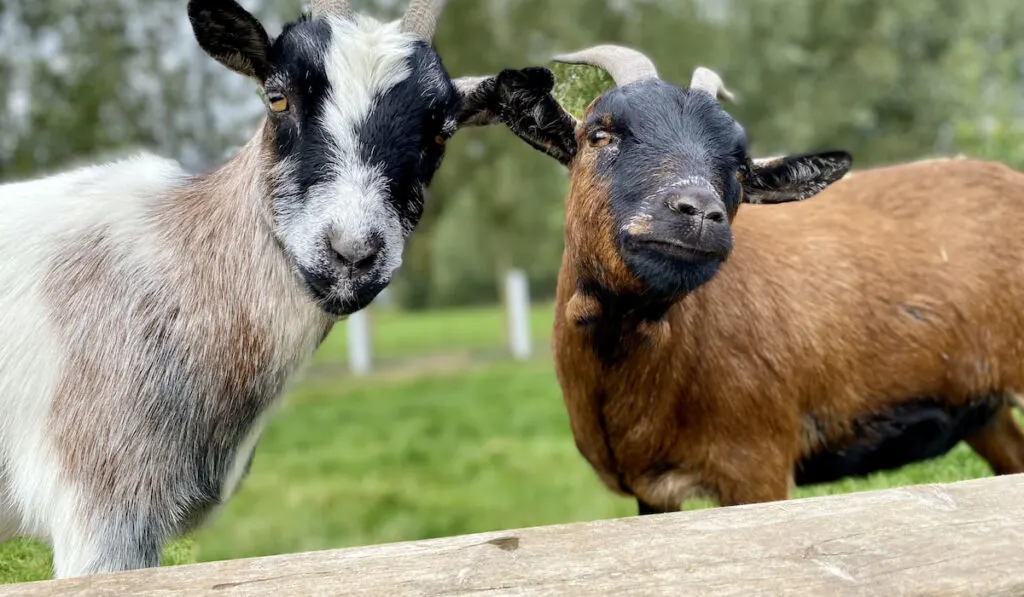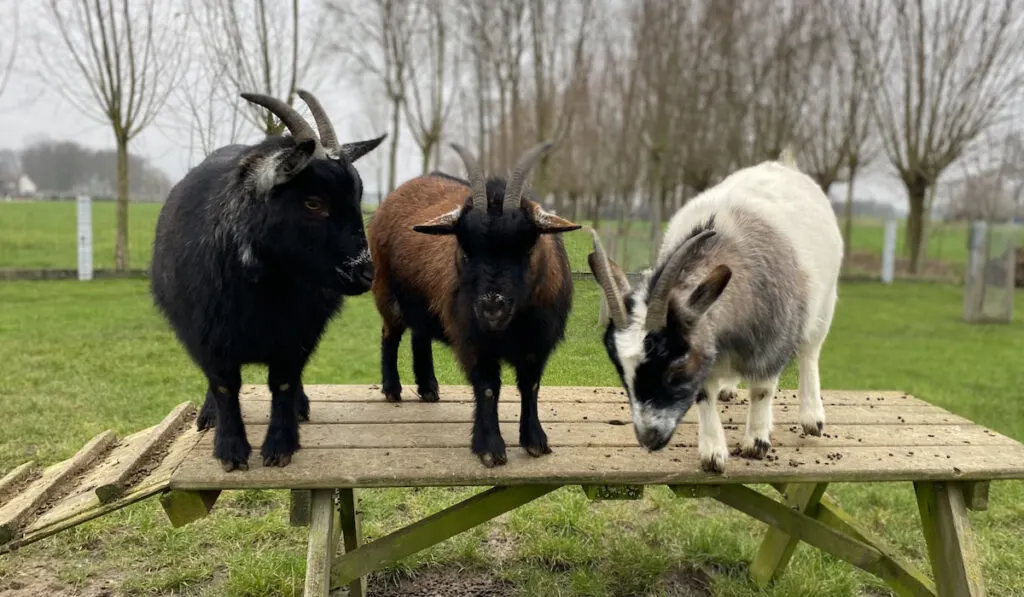Pygmy Goats commonly have large bellies that may cause them to look generally bigger. This can be caused by a number of factors including overating.
Overall, it should not be a health concern. Nevertheless, there are several factors that may contribute to your Pygmy Goat’s belly being large.
Pygmy Goats can have big bellies due to bloating, overeating or pregnancy. Rapid onset of a large belly is cause for concern and a veterinarian should be called for advice.

Table of Contents
Causes of large bellies
Bloating
Bloating may occur when the goat is not able to burp. The fermentation from their overall diet may create gas that can not be secreted.
Burping is used to get rid of the gas that builds up in the stomach. When this gas can not escape the goat through burping, it is stored within their bellies which may create bloating effects, making them look larger.
This large bulge may be on one or more sides of the goat and may look like a ball shape.
Overeating
When a goat has a large belly it may be thought of as bloating or fat. When a goat has a heavy diet it may cause them to gain weight, especially if these foods are high in fat, sodiums, and sugars.
This overall causes them to look and feel larger indicating the need for weight loss through increased exercise and a stricter diet.
Pregnancy
Female Pygmy Goats may become pregnant which will lead to an increase in belly weight over time. The gestation period for pregnancy is about 4.7 to 5 months.
The Pygmy Goat’s belly will slowly increase over time and it is important to see the signs and to take the proper steps to make sure they are properly cared for. This includes taking them to a veterinarian.
Some of the common signs of pregnancy in female Pygmy Goats include the following:
- Larger belly
- Lack of physical activity
- Increased/decreased appetite
These signs are common among pregnant Pgymy Goats and should be closely monitored to make sure they are healthy.
Large bellies on males and females
Pygmy Goats may differ in many areas, including their body weight and how it is stored throughout their bellies.
Typically a female goat may gain more weight in a small amount of time than male goats. Females commonly store more fat because their reproductive systems allow for the fat to be more visible and make them look larger, this could be a sign of overeating, lack of exercise, and even pregnancy.
It is important to monitor your goat’s weight and see if it has increased or decreased in short periods of time, if this is the case, it is important to get them to a veterinarian right away to diagnose and treat any problems.
Females are prone to bloating more easily especially if their diet contains high amounts of sodium and fats.
The male Pygmy Goat may have a large belly as a result of little or no exercise, an increase in diet, or other health problems that should be looked at and treated if occurring. Males typically gain weight less than females and therefore it would take them longer to obtain a large belly than a female.
Of course, this depends on the activity level, pedigree, and diet. If one’s belly is bloated it is nothing to worry about, whether it is in fact bloating or just an increase in weight or muscle gain.
If you believe your goat is having issues such as lethargy, little desire to walk around, or even stand up, it is important to take them to a vet straight away to help prevent any potential issues.
Sometimes a goat may look overweight or bloated but in reality, it could be completely healthy and normal. the average weight for a female Pygmy Goat is around 35-50 pounds while the average weight of a male Pygmy Goat is around 40-60 pounds. (source)

Is my goat overweight or bloated?
It may oftentimes be difficult to determine if your goat is overweight or bloated. Signs of a bloated goat may include:
- Restlessness (not wanting to lay down and relax, or moving frequently)
- Loss of appetite (the inability to eat or having little desire)
- Extended belly towards the left side (the belly region may look bigger almost like a balloon on the left side of their belly)
- Pain in the abdominal region (discomfort in the belly region including not wanting to lay on it, kicking or biting at the area, and lack of physical activity)
Some signs of an overweight goat include:
- Increased appetite (the desire to keep eating even when feeling full or having a sufficient amount of food in their diet)
- Large abdominal area (the skin around the abdominal area is plush and squishy which may indicate excessive fat)
- Overfeeding (when the owner overfeeds the goat this may cause an increase in body fat)
What is “hay belly?”
Hay belly is a common thing among goats, it is typically seen when they have a larger belly for several days. The reason for this could just be “hay belly”, which is when a goat contracts parasites, these parasites live in the belly.
Whenever the goat eats, the parasites initially eat the food, leaving the goat feeling hungry and unfulfilled, this leads the goat to eating more and an overall increase in their weight and bloat.
The overall term for “hay belly” means distended appearance, usually in the abdomen.
How do you get rid of hay belly in goats?
There are several tips and tricks that are used to get rid of hay belly in goats, one of the most common ways is cutting back on food.
Although this sounds difficult, it could help reduce the bloat overall. With being on a routine schedule for feeding, the goat will adapt to this and eat less, leading to less bloating and weight gain.
Another option is by talking to your veterinarian as they could provide you with medicines and techniques used to combat hay belly.
One of the most common treatments a veterinarian will provide include mineral oil which causes settling of the gases and acidic foams within the belly and allows for belching it out, essentially getting rid of the bloat over time.
It is important to talk to your veterinarian before doing this on your own or it may cause further problems if not done correctly!

Should you worry about large bellies on goats?
There is no need to worry about your goat having a large belly. Regardless if this is a result of overeating or just bloating, it is common and natural. Nevertheless, it is important to keep an eye out for the signs of bloating and keep track of the health of your goat.
If a goat is bloated it is a cause of buildup in gas around their stomach which causes a larger appearance, this could mean there are digestive issues or the goat is not getting enough nutrients to defecate or pass this gas properly.
This can easily be fixed by an increase in fiber but should still be watched and monitored for safety measures.
If a goat has a large belly due to high fat within their diet, there should either be less fat consumption or fewer portions to ensure your goat is healthy and not gaining too much weight to the point where it is unhealthy.
Special notes
If you believe your Pygmy Goat is displaying odd or abnormal behavior it is important to take them to a veterinarian right away.
This information listed is not to be used as medical treatment in any way and should not be treated as such. Taking your goat to a veterinary clinic right away may prevent and/or treat any potential or current illness.
Resources
- https://www.purinamills.com/goat-feed/education/detail/causes-of-bloat-in-goats
- https://thriftyhomesteader.com/goat-bloat/
- https://goats.extension.org/goat-bloat/
- http://www.westwightalpacas.co.uk/resident/pygmy-goats
- http://kinne.net/weights.htm
- http://www.goats4h.com/Pygmy.html
- https://backyardgoats.iamcountryside.com/health/goat-bloat-symptoms-treatment/
- https://animals.mom.com/signs-look-pygmy-goat-ready-give-birth-9759.html
